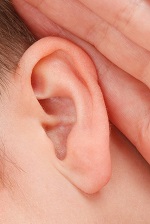
In the world, there are 1.5 billion people who have problems hearing and in 25 years, it'll go up by another billion. What did you say? Just kidding, that's a lot of people and Norbert, that may be us soon. Makes me think of a new study that won't help hearing loss that results from age, but it could reverse genetic causes of it.
The research worked with mice and focused on a gene mutation in Spns-two. The mutation changes the flow of chemicals into auditory sensing cells which is key to hearing. We hear when sound waves enter the ear canal and cause the ear drum to vibrate. The vibrations are amplified by three small bones in the middle ear and stimulate the fluid-filled inner ear. Waves move tiny hairs on sensory cells and this mechanical action causes chemicals to flow into these cells and generate electrical signals.
The mutation disrupted the last part of the process and caused progressive hearing loss in the mice. But when the Spns-two mutation was reversed, the mice could hear again.
They introduced into mice a functional Spns2 gene with a controllable "switch" they could turn on at different times as the mice aged. They found that hearing loss was mostly reversible in young mice but less so as the mice aged.
This confirms gene therapy may be a viable way to reverse even other genetic causes of hearing problems. Since more than half of hearing loss in babies is from gene mutations, the study could be a pathway for finding other gene-focused therapies.
You can now hear additional episodes on many of your favorite podcast providers - visit Buzzsprout to subscribe.
More Information
Scientists reverse hearing loss in mice
New research has successfully reversed hearing loss in mice. Scientists used a genetic approach to fix deafness in mice, restoring their hearing abilities in low and middle frequency ranges...
Reversing Hearing Loss
Gene reactivation restored hearing after loss in mice, but the timing of intervention is key...
Scientists Reverse Hearing Loss in Mice
Scientists at The Institute of Psychiatry, Psychology & Neuroscience (IoPPN) at King's College London have demonstrated that they can reverse hearing loss in specially bred mice...